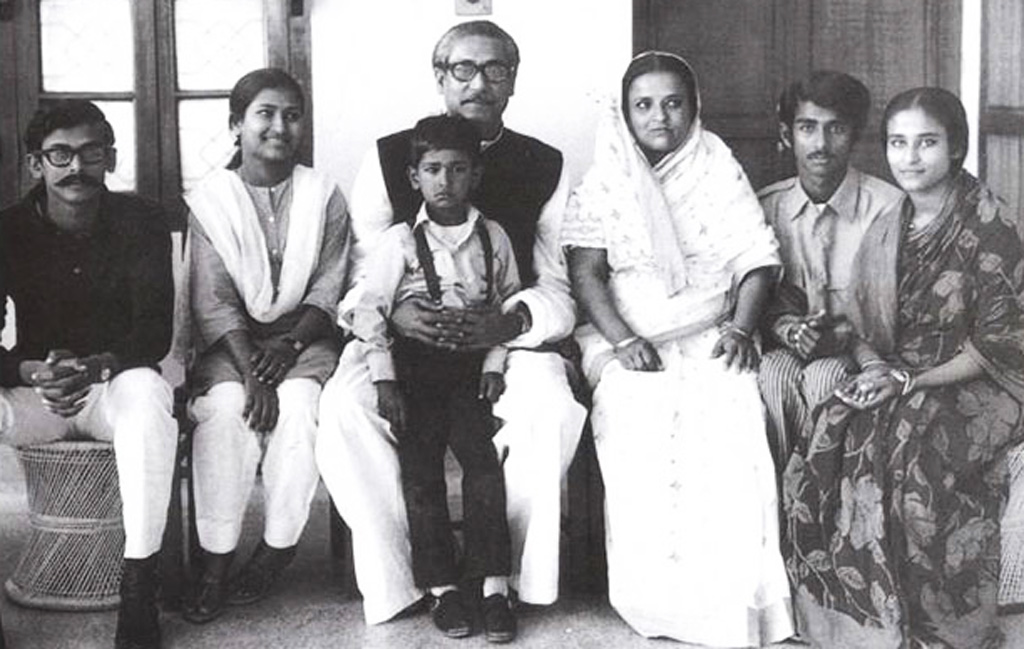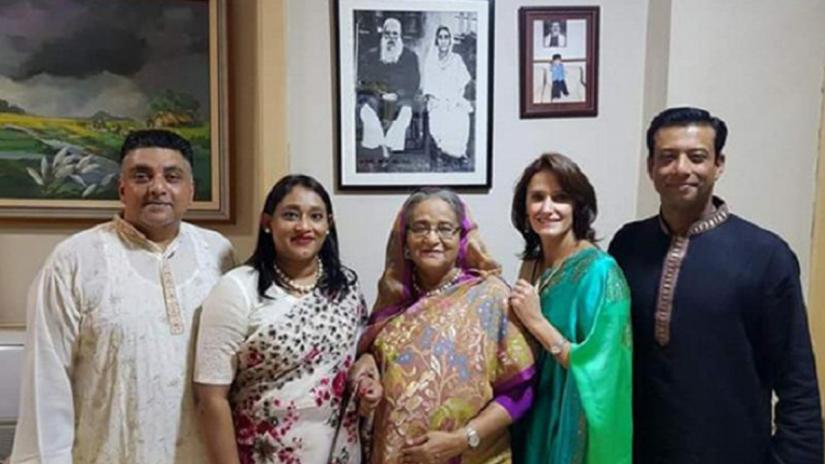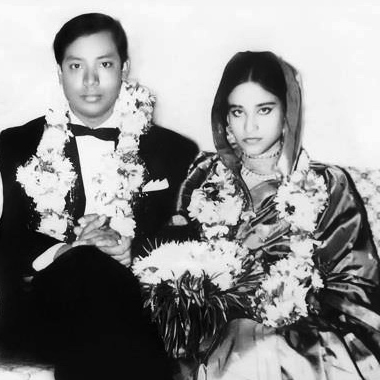Sheikh Hasina Height Weight Bra Size Age Biography Family Wiki Net Worth, Affairs, Marriage & much more. Sheikh Hasina Wazed (born 28 September 1947, is a Bangladeshi politician who has been serving as the Prime Minister of Bangladesh since January 2009. Hasina is the daughter of one of the founding members and the first serving president of Bangladesh; Sheikh Mujibur Rahman, titled by the republic as Bangabandhu, and the eldest of his five children. She previously served as prime minister from June 1996 to July 2001. She is the longest-serving prime minister in the history of Bangladesh, having served for a combined total of over 18 years. As of 22 May 2022, she is the world’s longest-serving elected female head of government.
Under her tenure as Prime Minister, Bangladesh has experienced democratic backsliding. The Human Rights Watch documented widespread enforced disappearances and extrajudicial killings under her government. Many politicians and journalists have been systematically and judicially punished for challenging her views. In 2021, the US has raised questions over the legitimacy of the Sheikh Hasina government over three years after the general elections. Reporters Without Borders in 2021 characterized sheikh Hasina as a predator for curbing press freedom in Bangladesh since 2014. In 2014, she was re-elected for a third term in an election that was boycotted by the BNP and criticized by international observers. She won fourth term in 2018, following an election marred with violence and criticized by the opposition as being rigged.
Sheikh Hasina has been considered one of the most powerful women in the world in several rankings.
Background and early life
Hasina was born in Tungipara, East Pakistan, on 28 September 1947. Her father was Sheikh Mujibur Rahman, the founding father and the first President of Bangladesh. Her mother was Sheikh Fazilatunnesa Mujib. She has said in many interviews that she had grown up in fear due to her father’s political works. She married physicist M. A. Wazed Miah in 1968, who was chosen for her by her father. During the peak of violence during the 1970 Pakistani general election, as well as her father’s arrest, she had lived in refuge with her grandmother. She was active in the student politics of the University of Dhaka.
Hasina was not in Bangladesh when her father, and most of her family, were assassinated on 15 August 1975 during a military coup d’état by renegade officers of the Bangladesh Army. She was in West Germany with her husband, M. A. Wazed Miah, who was working as a nuclear physicist. She moved to New Delhi in late 1975, having been granted asylum by India. Her son, Sajeeb Wazed Joy, studied at Indian boarding schools. During her time in India, Hasina was not involved in politics, but became close friends with Suvra Mukherjee, wife of the future Indian President Pranab Mukherjee.
Hasina was barred from returning to Bangladesh until after she was elected to lead the Awami League on 16 February 1981, and arrived home on 17 May 1981.
Personal life
In 1968, Hasina married M. A. Wazed Miah (1942–2009), a Bangladeshi physicist, writer, and Chairman of the Bangladesh Atomic Energy Commission. She has a son, Sajeeb Wazed, and a daughter, Saima Wazed. Saima’s father-in-law is a former minister of Expatriates’ Welfare and Overseas Employment and LGRD, Khandaker Mosharraf Hossain. Hasina’s only living sibling, Sheikh Rehana, served as the adviser of Tungipara upazila unit Awami League in Gopalganj in 2017.
Sheikh Hasina Age Husband Children Family Biography & More

| Bio/Wiki | |
|---|---|
| Full Name | Sheikh Hasina Wazed |
| Profession | Politician |
| Famous For | Prime Minister of Bangladesh |
| Physical Stats & More | |
| Eye Colour | Lavendar Grey |
| Hair Colour | Salt & Pepper |
| Politics | |
| Political Party | Bangladesh Awami League |
| Other Political Affilations | Grand Alliance (2008–present) |
| Political Journey | 1981: Elected as Chairperson of the ‘Awami League Party’. 1991: Became the Leader of the Opposition in the Fifth Parliament of Bangladesh. 1996: Elected and sworn in as the second female Prime Minister of Bangladesh. 2001: Lost the elections and led the party opposing the government for the next seven years. 2009: Elected as Prime Minister for the second time. 2014: Elected as Prime Minister for the third time. |
| Biggest Rival | Khaleda Zia |
| Personal Life | |
| Date of Birth | 28 September 1947 |
| Age (as in 2022) | 75 Years |
| Birthplace | Tungipara, Gopalganj District, East Bengal, Dominion of Pakistan (Now, in Bangladesh) |
| Zodiac sign/Sun sign | Libra |
| Signature | |
| Nationality | Bangladeshi |
| Hometown | Tungipara Upazila, Bangladesh |
| School | Ajimpur Girls’ School |
| College/University | Eden Mohila College University of Dhaka |
| Educational Qualification | Graduation |
| Religion | Islam |
| Caste/Sect | Sunni |
| Hobbies | Cooking, Reading |
| Awards, Honours, Achievements | 1997: Honorary Degree of Doctor of Law by the Boston University & Honorary Doctor of Law by the Waseda University, Honorary Doctorate of Philosophy in Liberal Arts by University of Abertay Dundee of the United Kingdom 1998: The Félix Houphouët-Boigny Peace Prize by the UNESCO, Mother Teresa Award by the All India Peace Council, M.K. Gandhi Award by the Mahatama M K Gandhi Foundation of Oslo, Norway 2000: Pearl S. Buck Award ’99 by Randolph Macon Women’s College of USA 2009: Indira Gandhi Prize 2014: UNESCO Peace Tree Award for her commitment to women’s empowerment and girl’s education 2015: UN environment Prize in New York, ICT in Sustainable Development Award by The International Telecommunication Union (ITU) 2016: Agent of Change Award, Planet 50-50 Champion honour for her outstanding contributions to women empowerment 2018: Global Women’s Leadership Award for her outstanding leadership in women’s education and entrepreneurship in Bangladesh |
| Controversies | • In 2007, Hasina was arrested for the charges of extortion. The Anti-Corruption Commission sent notices to both Hasina and Khaleda Zia, notifying them to provide details of their assets to the Commission within one week. • In the same year (2007), an additional case was filed against Hasina by the Anti-Corruption Commission regarding a contract for the construction of a power plant in 1997, for which she allegedly took a bribe of 30 million takas. • On 11 April 2007, the police filed murder charges against Hasina, alleging her to be the mastermind behind the killing of four supporters of a rival political party in October 2006. The four alleged victims were beaten to death during encounters between the Awami League and rival party activists. • Padma Bridge Scandal is the largest political scandal in Bangladesh that involved the ruling Bangladesh Sheikh Hasina’s Awami League’s government who allegedly borrowed a large amount of money from the Canadian construction company SNC-Lavalin in exchange for tendering them the construction contract. After this, The World Bank brought down a project of building Bangladesh’s largest bridge, citing corruption concerns, cancelling a $1.2bn (£764m) credit for road-rail bridge over the Padma River. To which Hasina claimed that an MD of a bank from the USA provoked the World Bank to cancel the loan. Though in 2017, an Ontario (Canada) Superior court justice dismissed the bribery-conspiracy case for lack of any proof. |
| Boys, Affairs and More | |
| Marital Status | Married |
| Marriage Date | 1968 |
| Family | |
| Husband/Spouse | Late M.A. Wazed Miah (1968-2009), a Nuclear Scientist |
| Children | Son– Sajeeb Wazed Joy (Businessman, Politician) Daughter– Saima Wazed Hossain (Autism Activist) |
| Parents | Father– Mujibur Rahman (politician) Mother– Fazilatunnesa Mujib |
| Siblings | Brother(s)– 3 (All were younger and all have died) Sister– Sheikh Rehana (Younger) |
| Net Worth (approx.) | ₹100 crore |

Controversies
The Padma Bridge graft scandal was a political incident in Bangladesh that involved the ruling Awami League government that allegedly sought, in exchange for the awarding of the construction contract, a large amount of money from the Canadian construction company SNC-Lavalin. The allegations were subsequently found to be false and without merit, and a Canadian court subsequently dismissed the case.
As a result of the allegations, The World Bank pulled out of a project to provide funding for the Padma Bridge, citing corruption concerns, cancelling ৳10241.346 crore (US$1.2 billion) of credit for the 6 km-long (four miles) road-rail bridge over the Padma River. One of the individuals implicated was Minister of Communications Syed Abul Hossain who subsequently resigned and was later acquitted of any wrongdoing. On 11 July 2012, BNP General-Secretary Mirza Fakhrul Islam Alamgir said the Awami League government should make public a letter sent by the World Bank, wherein the Bank brought graft charges against Hasina and three other figures. On 17 January 2016, Hasina stated that a managing director of a bank in the United States provoked the World Bank to cancel the loan.
On 24 January 2017, in a speech in parliament, Prime Minister Hasina blamed Muhammad Yunus for the World Bank’s pulling out of the project. According to her, Yunus lobbied with the former United States Secretary of State Hillary Clinton to persuade the World Bank to terminate the loan. On 10 February 2017, a justice of the Superior Court of Ontario dismissed the bribery-conspiracy case for lack of any evidence.
In 2018, Hasina’s government passed the controversial Digital Security Act, 2018, under which any criticism deemed inappropriate by the government over the internet or any other media could be punished by prison terms of various degrees. This was heavily criticised both domestically and internationally for suppressing people’s freedom of speech, as well as undermining press freedom in Bangladesh.

Writings
- সাদা কালো (Black and White)
- Democracy in Distress Demeaned Humanity
- শেখ রাসেল (Sheikh Rasel)
- আমরা জনগণের কথা বলতে এসেছি (We Came Here To Speak For The People)
- আন্তর্জাতিক সম্পর্ক উন্নয়নে শেখ হাসিনা (Sheikh Hasina On Developing International relations)
- Living in Tears
- রচনাসমগ্র ১
- রচনাসমগ্র ২
- সামরিকতন্ত্র বনাম গণতন্ত্র (Militarism versus Democracy)
- Development For the Masses
- Democracy Poverty Elimination and Peace
- বিপন্ন গণতন্ত্র লাঞ্চিত মানবতা (Endangered Democracy, Oppressed Humanity)
- জনগণ এবং গণতন্ত্র (People and democracy)
- সহেনা মানবতার অবমাননা (Can’t Tolerate the Insults of Humanity)
- ওরা টোকাই কেন (Why they are dumpster diving)
- বাংলাদেশে স্বৈরতন্ত্রের জন্ম (The Birth of Autocracy in Bangladesh)
- বাংলাদেশ জাতীয় সংসদে বঙ্গবন্ধু শেখ মুজিবুর রহমান (Sheikh Mujib in Bangadesh Parliament)
- শেখ মুজিব আমার পিতা (Sheikh Mujib: My father)
- সবুজ মাঠ পেরিয়ে (Beyond the green field)
- দারিদ্র দূরীকরণে কিছু চিন্তাভাবনা (Few Thoughts on Eradicating Poverty)
- বিশ্ব প্রামান্য ঐতিহ্যে বঙ্গবন্ধুর ভাষণ
- নির্বাচিত ১০০ ভাষণ (Selected 100 speeches)
- নির্বাচিত প্রবন্ধ (Selected Essay)
- The Quest For Vision 2021 – 1st part
- The Quest For Vision 2021 – 2nd part
- Muktidata Sheikh Mujib (Bengali: মুক্তিদাতা শেখ মুজিব) (Preface)
Honours
- Mother of humanity by Channel 4
- Planet 50–50 champion by UN-Women.
- Agent of Change Award by Global Partnership Forum.
- One of the Time 100 in 2018, where she was praised for accepting Rohingya refugees but criticised for “stumbling badly on human rights” and exhibiting a “tendency toward authoritarianism” by presiding over a government that uses extrajudicial killings and enforced disappearances to quash criticism and suppress political dissent.
- 59th place on Forbes‘ list of 100 most powerful women in the world.
- Degree of Doctor of Law by the Boston University on 6 February 1997.
- Honorary Doctor of Law by the Waseda University of Japan on 4 July 1997.
- Honorary Doctorate of Philosophy in Liberal Arts by the University of Abertay Dundee on 25 October 1997.
- The Félix Houphouët-Boigny Peace Prize by the UNESCO for 1998.
- Mother Teresa Award by the All India Peace Council in 1998.
- M.K. Gandhi Award for 1998 by the Mahatma M K Gandhi Foundation of Oslo, Norway.
- Awarded Medal of Distinction in 1996–97 and 1998–99 and Head of State Medal in 1996–97 by the Lions Clubs International.
- Honorary Degree of ‘Desikottama’ (Doctor of Literature, honoris causa) by the Visva-Bharati University of West Bengal, India on 28 January 1999.
- The Ceres Medal by the Food and Agriculture Organization for 1999.
- Doctor of Law (honoris causa), by the Australian National University on 20 October 1999.
- Honorary Doctor of Law by the University of Dhaka on 18 December 1999.
- Honorary Doctor of Humane Letters by University of Bridgeport on 5 September 2000.
- The Pearl S. Buck Award by the Randolph College on 9 April 2000.
- Named Paul Harris Fellow by the Rotary Foundation.
- Indira Gandhi Prize for 2009.
- Doctor of Literature (honoris causa) by the Tripura University in January 2012.
- UNESCO Peace Tree award for her commitment to women’s empowerment and girl’s education in 2014.
- UN environment prize for leadership on climate change.
- Doctor of the University (Honorary) by the Sher-e-Bangla Agricultural University on 16 November 2015.
- Doctor of Letters (Honorary) by the Kazi Nazrul University, West Bengal, India on 26 May 2018.
